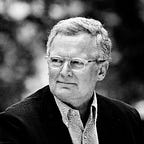Business Game Design
Smart contracts substitute boundaries. The kernel of a firm is a live social graph of networked interdependence and accountability.
In organization theory, firms are commonly understood as entities adapting to the changing environment. The post-industrial approach is different. It associates change with becoming.
Becoming indicates that nothing exists in a final state and all entities are in a continuous movement in time, not through adaptation, but through emergence, through responsive connecting with the new. The focus is on the connecting of people and events in a game-like environment.
But we need a new concept of games. Zero-sum games were the offspring of scarcity. The players and their contributions in the real world are, and should be, too qualitatively different to be compared quantitatively. In the era of creative learning and abundance, the aim is not to have a few winners and many losers as in our corporate games today.
The meaning of becoming can only be understood through temporality as the lens to reality. Under circumstances of rapid technological change, the (management) challenge is to create openness to possibilities and plausible options. Success in the game is about recombining these options and diverse contributions in a competitive and cooperative environment. Technology and development in general are not isolated acts, but a complex storyline.
There are always more possibilities in this game than the strategic moves that are typically considered. The networked events also embody more connecting possibilities than can be explicitly articulated at any given time. In games people are all the time in the middle of doing something, while remembering things they were doing and preparing for things they are going to do. Past and future are not distinct from the present but dimensions of the present. Essentially, players are all the time in the process of pursuing possibilities while preserving a sense of continuity.
What happens at one time and place matters to what happens at another time and place. The events in the game are woven together in a continuum. The difference in thinking is that these events and the positive- or negative network effects they create are not seen to take place within an organization, but are seen to form the organization. The game creates the board.
New people join and people leave. Work is dynamic participation and influencing how the game develops. It is based on the radical openness that smart contracts make possible. By drawing a boundary around the organization, we made the assumption that interactions within the boundary are more significant than interactions with actors outside that boundary. This way of thinking was acceptable in repetitive work where it was relatively easy to define what needed to be done and by whom as a definition of the quantity of labor and quality of capabilities, but not anymore.
For example, a key player, the customer, is now seen as being directly and actively involved in the key moments of value creation as opposed to passively consuming value. There are profound implications that result from this change of thinking. Products and services are not reproducible as such any more. Solutions are by default contextual, but they can be starting points for someone else to play, to solve problems elsewhere.
Creative, connected learning is at the core of the game.
Organizations can then be described as particular formations and dynamics of these connecting processes. Connecting makes the actors, not the other way around. Actors do not exist independently of what is done to invoke them. What we have called the individual mind is something that arises continuously in relationships between people, in communication. This is also how organizations are born and how they develop, or how they get stuck.
The new (technological) task is to make possible easy and fast emergent formation of groups and to make it as easy as possible for the best contributions from the whole network to find the applicable events in the game.
Sometimes people play together for a long time, sometimes for a very, very short time. We want to do something as we join a game — with other people and with technological intelligence. The defining characteristic of post-industrial economic spaces is the increased, non-algorithmic, variety of behaviors that is available. It is not necessarily about common goals or even shared purposes any more.
Smart contracts substitute boundaries. The architecture of work is a live social graph of networked interdependence and accountability.
.
Credits Tor Hernes and Pekko Koskinen
The NewCo Shift Management channel is brought to you by Work Market, the leading labor automation platform. Work Market empowers businesses and skilled professionals to unlock new levels of productivity, engagement and growth across the entire lifecycle of work. Learn more here.
